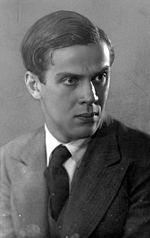About Józef Łobodowski
- Józef Stanislaw Lobodowski was a Polish poet and political thinker. Lobodowski was born 19 March 1909 at the Purwiszki country estate, Sejny County in the Suwalki Land (Pol., Suwalszczyzna), Polish lands of the Russian Partition (now within the territory of Lithuania) and died 18 April 1988 in Madrid. His poetic works are broadly divided into two distinct phases: the earlier one, until about 1934, in which he was sometimes identified as "the last of the Skamandrites", and the second phase beginning about 1935, marked by the pessimistic and tragic colouring associated with the newly nascent current in Polish poetry known as katastrofizm (catastrophism).
- The evolution of his political thought, from the radical left to radical anticommunism, broadly paralleled the trajectory of his poetic oeuvre. To the contemporary reading public Lobodowski was also known as the founder and editor of several avant-garde literary periodicals, of a newspaper, translator, novelist, prose writer in the Polish and Spanish languages, radio personality, and preeminently a prolific opinion writer with sharply defined political views active before, during and after the Second World War in the Polish press (since 1940 only in the émigré press).
- Lobodowski described himself as a Ukrainophile and devoted three of his books to Ukrainian themes, including two collections of poetry (Piesn o Ukrainie and Zlota hramota).
- He spoke out in defence of ethnic minorities in Poland before and after the Second World War, condemning for example the forced resettlement of the Lemko community in the so-called Operation Vistula mounted by the communist régime in 1947, or the destruction of churches built in the Eastern Orthodox architectural style out of favour in the Western-oriented Poland of the Interbellum.
- He denounced in print the anti-Jewish sentiment prevalent in some Polish literary circles before the War, defending for example the Polish poet Franciszka Arnsztajnowa against antisemitic attacks.
- An inveterate and caustic critic of totalitarianism in all its forms, he was blacklisted by the communist censorship of the post-War Poland and spent most of his life in exile in Spain.
Read more at Wikipedia
See Also
- Famous People's Birthdays on 19 March, Poland
- Famous People's Birthdays in March, Poland
- Famous poet's Birthdays on 19 March, Poland
- Famous poet's Birthdays in March, Poland
- Famous translator's Birthdays on 19 March, Poland
- Famous translator's Birthdays in March, Poland
- Famous linguist's Birthdays on 19 March, Poland
- Famous linguist's Birthdays in March, Poland


 Date of Birth:
Date of Birth: 